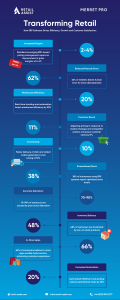Written by Mamoon Malik, Digital Marketing Executive
SubscribeRetailers are constantly battling to enhance efficiency, boost customer satisfaction and combat declining profit margins. Despite these pressing challenges, a surprising 44% of the retail sector are yet to digitise their operations, highlighting significant potential for transformation. ERP software is a pivotal resource in fighting these challenges as one of the most strategic assets supporting a retailer’s growth, enabling them to enter new channels and tap into new audiences.
Discover how ERP software is transforming retail and leverage insights from industry thought-leaders McKinsey, Accenture, and Shopify to inform your next move and scale your business confidently.

Research by McKinsey shows that retailers leveraging ERP-based pricing management tools report an improvement in gross margins of 2-4%. By automating the pricing process and making informed decisions based on real-time data, retailers can better respond to market fluctuations and competitive actions. This not only helps in attracting more customers but boosts profit margins too.
Shopify reports that a staggering 62% of retailers blame human error for stock discrepancies. Traditional methods of stock management are prone to mistakes, whether it’s miscounting inventory or misplacing items. ERP software mitigates these risks by automating stock checks and providing accurate, real-time data.
Implementing real-time tracking and automation in warehouse operations has the potential to significantly increase efficiency, with reports indicating an improvement of up to 20%. ERP software provides tools for tracking inventory, reducing the time and effort required for manual stock checks. This not only cuts operational costs but also speeds up the fulfilment process, ensuring that products are available when customers need them.
Adjusting pricing in response to market changes and competitor actions can increase customer visits by 11%. ERP software enables retailers to dynamically adjust prices based on a variety of factors, such as inventory levels, seasonal demand, historical sales data, and competitor pricing, ensuring they remain competitive in the marketplace.
ERP-based dynamic pricing allows retailers to offer more attractive pricing options, which in turn attract more customers and drive sales. Customers are more likely to return to a store that consistently offers competitive prices, building trust and fostering loyalty.
Implementing faster delivery for click-and-collect orders can generate cost savings of up to 10%. This accelerated process not only enhances customer satisfaction but also reduces the risk of overstocking or stockouts, minimises overhead costs associated with slow deliveries and improve overall profitability.
According to reports, 38% of businesses using ERP software report optimised inventory levels in their stores. By leveraging real-time data and automated stock management, ERP software enables retailers to maintain optimal stock levels. This ensures they have sufficient inventory to meet customer demand without the risk of overstocking, which can tie up capital and increase storage costs. ERP software also facilitates a balanced inventory that supports both cost efficiency and high service levels.
Poor stock allocation is responsible for 70-90% of stockouts, yet implementing ERP software significantly helps retailers mitigate this challenge. ERP software enables retailers to allocate stock more effectively, ensuring that popular items remain available, reducing stockouts. While 48% of customers still report frustration with out-of-stock products, ERPs offer real-time inventory data and advanced forecasting capabilities, helping retailers maintain optimal stock levels, enhancing customer satisfaction and minimising frustration.
66% of consumers believe that in-store apps enable faster service, thereby enhancing the overall customer experience (CX). By integrating with ERP software, in-store apps can provide real-time inventory data, personalised offers, and quicker checkout processes. This seamless integration results in a more satisfying shopping experience by ensuring that customers have access to accurate product information, tailored promotions, and efficient transactions.
Automated fulfilment and picking can reduce operational costs by up to 20%. ERP software facilitates this through intelligent automation. ERP software can automatically allocate orders to the appropriate inventory, reducing manual intervention and errors. By automating these processes, retailers can significantly save on labour costs and minimise errors often associated with manual handling. This leads to substantial cost savings and increases operational efficiency.
The exponential benefits of ERP software are no longer just theoretical—they are a proven catalyst for retail transformation. improvement in gross to the enhanced warehouse efficiency and substantial cost savings, the advantages are clear. As customer expectations evolve and competitive pressures intensify, the 44% of retailers yet to digitise their operations are missing out on an opportunity to reduce operational costs, attract more customers, ensure a seamless shopping experience and maximise profit margins.
Whether it’s through dynamic pricing, real-time stock management, or faster order fulfilment, an ERP could be the critical differentiator in scaling your brand and entering new market channels. The question is: are you ready to transform your brand?
Need advice on choosing the right ERP solution for your business? Talk to us today.
Written by Mamoon Malik, Digital Marketing Executive
Share this post
SubscribeWe think you might like these posts too
© 2026 Retail Assist Limited. The Hub Floor 5A, 40 Friar Lane, Nottingham, NG1 6DQ.
Registered in England. Company number: 03790674
info@retail-assist.com | +44 (0)115 904 2777
Website Designed & Built by we are CODA